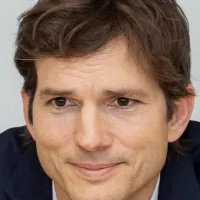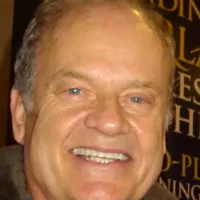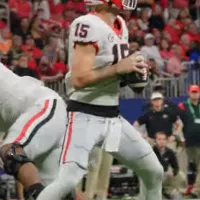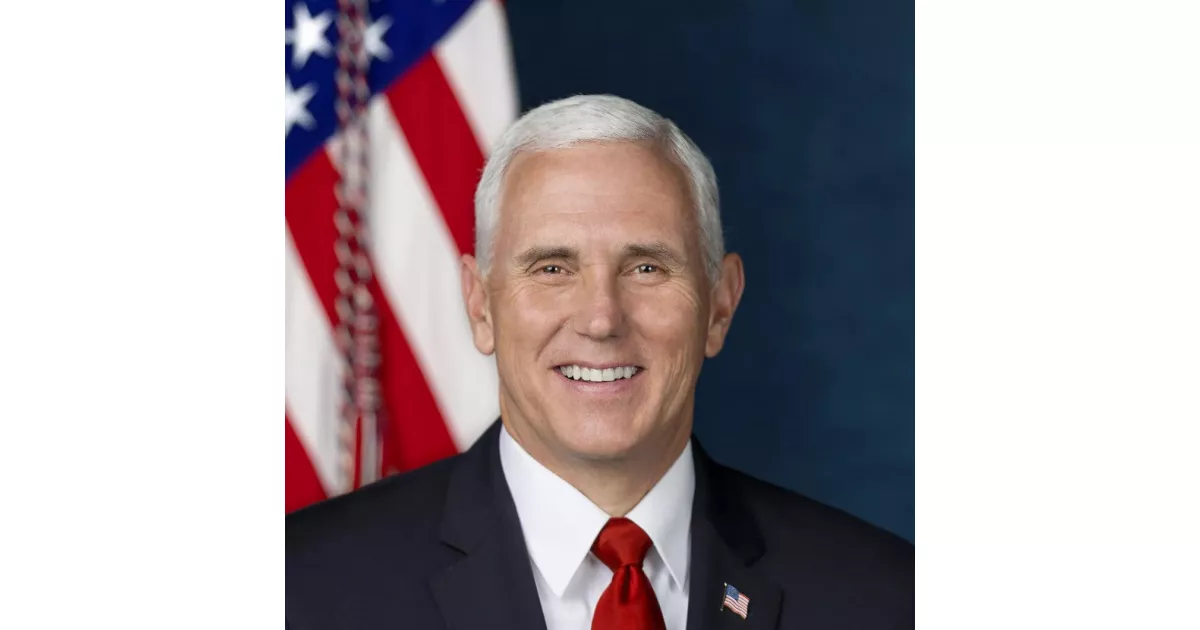How Mike Pence built a successful career. Explore key moments that defined the journey.
Michael Richard Pence is an American politician and lawyer. He was the 48th Vice President of the United States under President Donald Trump, serving from 2017 to 2021. A Republican, he previously served as the 50th Governor of Indiana from 2013 to 2017. Prior to his governorship, Pence represented Indiana in the U.S. House of Representatives from 2001 to 2013. His career has been marked by a consistent conservative stance on various political and social issues.
1981: First Representative From Indiana to Hold a House Leadership Position since 1981
In January 2009, Mike Pence was the first representative from Indiana to hold a House leadership position since 1981.
1983: Worked as Admissions Counselor
From 1981 to 1983, Mike Pence was employed as an admissions counselor at Hanover College, following his graduation.
1986: Began Private Law Practice
After graduating from law school in 1986, Mike Pence started working as an attorney in private practice, launching his legal career.
1988: Lost Congressional Bid
In 1988, Mike Pence ran for Congress against Democratic incumbent Philip Sharp but was unsuccessful in his bid.
1988: Hosted "Washington Update with Mike Pence" Radio Show
Shortly after his first congressional campaign in 1988, Mike Pence began hosting a weekly half-hour radio show called "Washington Update with Mike Pence" on WRCR-FM in Rushville, Indiana.
1990: Ran Controversial Television Advertisement
During the 1990 congressional campaign, Mike Pence ran a television advertisement featuring an actor in Middle Eastern garb, criticizing his opponent's energy policy.
1990: Second Unsuccessful House Bid
In 1990, Mike Pence made a second attempt to win a seat in the House of Representatives but was again unsuccessful.
1990: Second Unsuccessful Congressional Run
In 1990, Mike Pence ran against Philip Sharp again for Congress, quitting his job to focus on the campaign, but lost again.
1992: Started Hosting "The Mike Pence Show"
In 1992, Mike Pence began hosting a daily talk show on WRCR called "The Mike Pence Show", along with a Saturday show on WNDE in Indianapolis.
1993: End of Presidency of Indiana Policy Review Foundation
In 1993, Mike Pence concluded his role as the president of the Indiana Policy Review Foundation, a position he had held since 1991.
April 11, 1994: Network Indiana Syndicated "The Mike Pence Show"
On April 11, 1994, Network Indiana began syndicating "The Mike Pence Show" statewide, expanding its reach to as many as 18 radio stations, including WIBC in Indianapolis.
1994: Began Hosting Radio and Television Talk Shows
In 1994, Mike Pence started his career as a conservative radio and television talk show host, which lasted until 1999.
1994: Referenced 1994 Republican Revolution
In November 2006, when announcing his run for Minority Leader, Pence's release focused on a "return to the values" of the Newt Gingrich-headed 1994 Republican Revolution.
1995: Hosted Weekend Public Affairs TV Show
From 1995, Mike Pence also hosted a weekend public affairs television show, likewise titled "The Mike Pence Show", on Indianapolis TV station WNDY.
1999: End of Talk Show Hosting
In 1999, Mike Pence ended his career as a radio and television talk show host.
1999: Ended Radio and Television Shows
In 1999, Mike Pence ended his radio and television shows to focus on his 2000 campaign for Congress.
2000: Won Election to U.S. House of Representatives
In 2000, Mike Pence successfully ran for the U.S. House of Representatives, representing Indiana's 2nd congressional district.
2000: Elected to the House
In 2000, Mike Pence was elected to the U.S. House of Representatives, representing Indiana's 2nd district.
2000: Won Congressional Election
In 2000, Mike Pence won the election for the U.S. House of Representatives, marking a turning point in his political career.
2001: Represented Indiana's 2nd District
From 2001 to 2003, Mike Pence represented Indiana's 2nd congressional district in the U.S. House of Representatives.
2001: Elected to the U.S. House of Representatives
In 2001, Mike Pence was elected as a member of the U.S. House of Representatives from Indiana, beginning his tenure in Congress.
2001: Opposed No Child Left Behind Act
In 2001, during his first year in office, Mike Pence opposed President George W. Bush's No Child Left Behind Act.
2003: Represented Indiana's 6th District
From 2003 to 2013, Mike Pence represented Indiana's 6th congressional district in the U.S. House of Representatives.
2003: Opposed Medicare Prescription Drug Expansion
In 2003, Mike Pence opposed President George W. Bush's Medicare prescription drug expansion, showcasing his conservative stance.
2005: Chairman of the Republican Study Committee
From 2005 to 2007, Mike Pence served as the chairman of the Republican Study Committee, a group of conservative House Republicans.
November 2006: Announced Candidacy for Minority Leader
In November 2006, Mike Pence announced his candidacy for leader of the Republican Party (minority leader) in the United States House of Representatives.
2006: Re-elected to the House
Mike Pence was re-elected in 2006 to the US House of Representatives defeating Democrat Barry Welsh.
2007: End of Republican Study Committee Chairmanship
In 2007, Mike Pence's tenure as chairman of the Republican Study Committee concluded.
2008: Re-elected to the House
Mike Pence was re-elected in 2008 to the US House of Representatives defeating Democrat Barry Welsh.
January 2009: Elected Republican Conference Chairman
In January 2009, Mike Pence was elected as the Republican Conference chairman, the third-highest-ranking Republican leadership position at the time.
2009: Chaired the House Republican Conference
From 2009 to 2011, Mike Pence chaired the House Republican Conference.
2009: American Recovery and Reinvestment Act
In 2009, the American Recovery and Reinvestment Act was enacted, funding the Indiana Gateway project that Pence later supported.
September 2010: Top Choice for President in Straw Poll
In September 2010, Mike Pence was the top choice for president in a straw poll conducted by the Values Voter Summit.
2010: Re-elected to the House
Mike Pence was re-elected in 2010 to the US House of Representatives defeating Democrat Barry Welsh.
2010: Indiana's Credit Ratings Maintained
Since 2010, prior to Mike Pence taking office, Indiana maintained AAA credit ratings with the three major credit-rating agencies. These ratings were sustained throughout Pence's tenure as governor.
May 2011: Announced Candidacy for Governor of Indiana
In May 2011, Mike Pence announced that he would be seeking the Republican nomination for governor of Indiana in 2012.
2011: End of House Republican Conference Chairmanship
In 2011, Mike Pence's tenure as the chairman of the House Republican Conference concluded.
2012: Elected Governor of Indiana
In 2012, Mike Pence was elected as the Governor of Indiana, winning a close race with just under 50% of the vote.
2012: Mentioned as Possible Republican Candidate for President
In 2012, Mike Pence was mentioned as a potential Republican candidate for president, though he did not ultimately run.
January 14, 2013: Sworn in as Governor of Indiana
On January 14, 2013, Mike Pence was sworn in as the 50th governor of Indiana, commencing his term in office.
June 12, 2013: Legislature Overrides Pence's Veto
On June 12, 2013, the Indiana Legislature overrode Governor Pence's veto of a bill related to a local tax authorization. The veto override occurred with a 68-23 vote in the House and a 34-12 vote in the Senate, with most Republican legislators voting against Pence's veto.
2013: Increased School Voucher Eligibility
In 2013, Governor Pence signed legislation into law that greatly increased the number of students in Indiana who qualify for school vouchers, making it one of the largest voucher programs in the United States.
2013: Became Governor of Indiana
In 2013, Mike Pence assumed office as the 50th Governor of Indiana, marking a significant milestone in his political career.
2013: End of House of Representatives Service
In 2013, Mike Pence concluded his service in the U.S. House of Representatives.
2013: Tax Reform Prioritization
In 2013, Mike Pence prioritized tax reform in Indiana, specifically advocating for a ten percent income-tax rate cut. Although he didn't achieve the full ten percent cut, Pence successfully reduced state taxes by five percent and eliminated the inheritance tax. This legislative package was considered the largest tax cut in the state's history, totaling approximately $1.1 billion.
2013: Signed Law Blocking Local Wage and Benefit Requirements
In 2013, Mike Pence signed a law preventing local governments in Indiana from requiring businesses to offer wages or benefits exceeding federal law mandates.
2014: Firearms Allowed on School Property
In 2014, Governor Pence signed a bill allowing firearms to be kept in vehicles on school property, despite opposition from Indiana school organizations.
2014: Indiana Gateway Project Supported
In 2014, Mike Pence supported the Indiana Gateway project, a $71.4 million passenger and freight rail improvement initiative funded by the American Recovery and Reinvestment Act of 2009.
2014: State Preschool Pilot Program Established
In 2014, a little over one year after taking office, Pence helped establish a $10-million state preschool pilot program in Indiana and testified personally before the state Senate Education Committee in favor of the program to convince fellow Republicans.
2014: Call for Repeal of Common Core Standards
In his 2014 State of the State address, Governor Pence called for the repeal of the Common Core State Standards Initiative. Subsequently, the Indiana General Assembly passed a bill to repeal the standards, making Indiana the first state to do so.
January 2015: State of the State Address
In January 2015, Governor Pence proposed a balanced budget amendment to the state's constitution during his State of the State address. The legislation subsequently passed the state Senate.
May 2015: Lawsuit Limitations Against Gun Manufacturers Signed
In May 2015, Governor Pence signed Senate Bill 98 into law, which limited lawsuits against gun and ammunition manufacturers and sellers and retroactively terminated the City of Gary's lawsuit against gun manufacturers and retailers from 1999.
October 2015: Federal Loan Payoff Announced
In October 2015, Governor Pence announced plans to pay off a $250 million federal loan that had been used to cover unemployment insurance payments, which had increased during the recession.
2015: Charter School Funding Secured
In 2015, Governor Pence secured significant increases in charter school funding through legislation, though he did not achieve all of his initial proposals.
2015: Repeal of Prevailing Wage Law
In 2015, Mike Pence signed the repeal of an Indiana law mandating construction companies on publicly funded projects to pay a prevailing wage.
2015: Support for Coal Industry
In his 2015 State of the State address, Governor Pence declared that "Indiana is a pro-coal state" and expressed support for an "all-of-the-above energy strategy". He also stated opposition to the EPA's Clean Power Plan.
March 2016: Road-Funding Package Signed
In March 2016, Governor Pence signed legislation to fund a $230 million two-year road-funding package for the state of Indiana.
2016: Captive Deer Hunting Legalized
In 2016, Governor Pence signed Senate Bill 109 into law, legalizing the captive hunting of farm-raised deer in Indiana.
2016: Nominated as Trump's Running Mate
In 2016, Mike Pence became Donald Trump's running mate in the presidential election.
May 2017: Pence Forms Great America Committee PAC
In May 2017, Mike Pence filed paperwork to form the Great America Committee, a political action committee (PAC), while still in office as vice president. He also denied allegations that he would run for president in 2020.
2017: Served as Vice President
From 2017 to 2021, Mike Pence served as the Vice President of the United States under President Donald Trump.
2017: Became Vice President of the United States
In 2017, Michael Pence became the 48th Vice President of the United States under President Donald Trump.
October 2018: Pence's Speech on China at the Hudson Institute
In October 2018, Mike Pence delivered a speech at the Hudson Institute, accusing China of predatory economic practices, military aggression, and attempting to undermine President Trump. He also alleged Chinese interference in U.S. elections and human rights abuses. The New York Times described the speech as a declaration of a new Cold War.
2018: Greg Pence Wins Congressional Seat
In 2018, Pence's older brother, Greg, won the election to represent Indiana's 6th congressional district in Congress. Greg also acted as a decoy to lure the press away from Mike Pence when he was being considered as a potential running mate to Donald Trump.
June 2019: Suggestion to Replace Pence as Trump's Running Mate
In June 2019, it was suggested that Trump could improve his reelection chances by replacing Pence with Nikki Haley as his running mate. Despite this, Trump affirmed that Pence would remain his running mate.
January 2020: Pence Defends Soleimani Assassination
In January 2020, Mike Pence defended Trump's decision to assassinate Qasem Soleimani, promoting conspiracy theories linking al-Qaeda to Iran. Pence claimed Soleimani assisted the 9/11 terrorists, which drew criticism and was considered unsubstantiated by many experts.
February 2020: Pence Defends Debt- and Deficit-Spending
In February 2020, Mike Pence defended debt- and deficit-spending as a means to stimulate economic growth.
February 26, 2020: Pence Leads White House Coronavirus Task Force
On February 26, 2020, President Trump appointed Mike Pence to lead the White House Coronavirus Task Force to combat the spread of the COVID-19 pandemic in the U.S. As leader, Pence coordinated efforts across multiple government agencies.
October 7, 2020: Pence Participates in Debate with Kamala Harris
On October 7, 2020, Mike Pence debated Kamala Harris, hosted by USA Today in Salt Lake City, Utah. The debate included adaptations due to COVID-19 concerns. Polls indicated that more registered voters believed Harris won the debate.
2020: Lost Re-election Bid
In the 2020 presidential election, Mike Pence and Donald Trump lost their bid for re-election to Joe Biden and Kamala Harris.
January 6, 2021: Oversaw Certification of Election Results
On January 6, 2021, despite pressure from President Trump to overturn the election results, Mike Pence oversaw the certification of Joe Biden and Kamala Harris as the winners of the 2020 presidential election.
January 20, 2021: Pence leaves office
On January 20, 2021, Pence left office as Vice President and was succeeded by Kamala Harris.
February 2021: Pence joins The Heritage Foundation and Young America's Foundation
In February 2021, Pence joined The Heritage Foundation as a distinguished visiting fellow and the Young America's Foundation, planning to launch a new podcast.
March 2021: Pence narrates "Age of Rush" series
In March 2021, Pence narrated a four-part television series on Rush Limbaugh's career, titled "Age of Rush", which debuted on Fox Nation.
April 2021: Pence signs book deal with Simon & Schuster
In April 2021, Pence signed a deal with publisher Simon & Schuster for two books, including an autobiography.
2021: End of Vice Presidency
In 2021, Mike Pence's term as the 48th Vice President of the United States came to an end with the inauguration of the new administration.
2021: Pence's potential presidential campaign
In 2021, polls implied that Pence could begin a 2024 campaign as a top-tier candidate if Trump didn't run, but his numbers would decline if Trump sought the presidency again.
May 2022: Pence considers presidential run
In May 2022, The New York Times reported that Pence was considering a presidential run regardless of Trump's decision.
July 2022: Pence appears in documentary "Unprecedented"
In July 2022, Pence appeared in the documentary "Unprecedented".
June 5, 2023: Pence launches presidential bid
On June 5, 2023, Pence officially launched his bid for the presidency.
June 2023: Launched 2024 Presidential Bid
In June 2023, Mike Pence launched a campaign for the 2024 presidential election, but later withdrew by October.
October 28, 2023: Pence withdraws from presidential race
On October 28, 2023, Pence, with weak fundraising and poll numbers, withdrew from the presidential race.
September 2024: Pence begins teaching at Grove City College
In September 2024, Pence began teaching seminar and lecture courses in political science at Grove City College in Pennsylvania as its first Distinguished Fellow for Faith and Public Life.
2024: Views on Pence's 2024 Campaign
In 2021, there was a widespread view among Republican leaders and grassroots Republicans that "Pence is dead in the early waters of 2024." regarding his prospects in the 2024 campaign.
2024: Pence visits Ukraine
In July 2023, Pence became the first 2024 Republican presidential candidate to visit Ukraine, where he met President Volodymyr Zelenskyy.
September 17, 2025: Pence to join George Mason University as professor
On September 17, 2025, it was announced that Pence would begin as a professor at the George Mason University Schar School of Policy and Government for the Spring 2026 semester, serving as a "distinguished professor of practice".
2026: Pence to serve as "distinguished professor of practice"
On September 17, 2025, it was announced that Pence would begin as a professor at the George Mason University Schar School of Policy and Government for the Spring 2026 semester, serving as a "distinguished professor of practice".
Mentioned in this timeline

Donald John Trump is an American politician media personality and...
Ukraine is a large country in Eastern Europe second in...
Facebook is a social media and networking service created in...

George W Bush the rd U S President - is...

The White House located at Pennsylvania Avenue NW in Washington...
The Affordable Care Act ACA also known as Obamacare is...
Trending
Justice Haynes is an American college football running back currently playing for the Michigan Wolverines He began his college career...

8 months ago Ashton Kutcher and Mila Kunis's bathing habits spark debate; Taylor met the couple.

Ana Violeta Navarro-C rdenas is a Nicaraguan-American political strategist and commentator known for her appearances on various television programs and...

1 month ago Nina Dobrev enjoys Mexican getaway with friends after Shaun White split, finding beach vibes.

2 months ago Kendall Jenner Celebrates Her 30th Birthday with Nude Beach Photos and Bikini Looks

Martin Luther King Jr was a pivotal leader in the American civil rights movement from until his assassination in As...
Popular

XXXTentacion born Jahseh Dwayne Ricardo Onfroy was a controversial yet...

Stranger Things created by the Duffer Brothers is a popular...

Kelsey Grammer is an accomplished American actor producer and singer...

Carson Beck is an American college football quarterback currently playing...

Marco Rubio is an American politician attorney and diplomat He...

Candace Owens is an American conservative political commentator and author...
